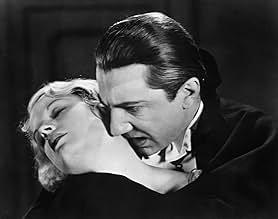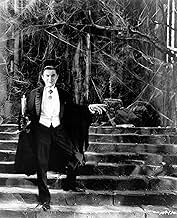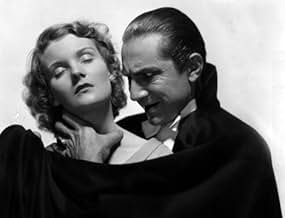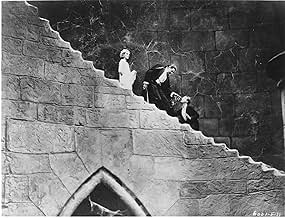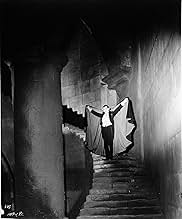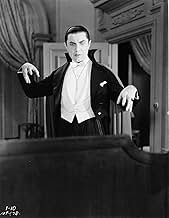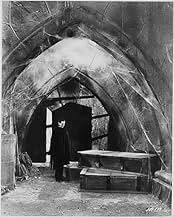Dracula
- 1931
- Tous publics
- 1h 15min
NOTE IMDb
7,3/10
63 k
MA NOTE
Le vampire ancien et comte Dracula arrive en Angleterre et commence à s'en prendre à la jeune et vertueuse Mina.Le vampire ancien et comte Dracula arrive en Angleterre et commence à s'en prendre à la jeune et vertueuse Mina.Le vampire ancien et comte Dracula arrive en Angleterre et commence à s'en prendre à la jeune et vertueuse Mina.
- Réalisation
- Scénario
- Casting principal
- Récompenses
- 5 victoires et 3 nominations au total
Charles K. Gerrard
- Martin
- (as Charles Gerrard)
Anna Bakacs
- Innkeeper's Daughter
- (non crédité)
Bunny Beatty
- Flower Girl
- (non crédité)
Nicholas Bela
- Coach Passenger
- (non crédité)
Daisy Belmore
- Coach Passenger
- (non crédité)
William A. Boardway
- Concertgoer Outside Theatre
- (non crédité)
Barbara Bozoky
- Innkeeper's Wife
- (non crédité)
Tod Browning
- Harbormaster
- (voix)
- (non crédité)
Moon Carroll
- Maid
- (non crédité)
Geraldine Dvorak
- Dracula's Wife
- (non crédité)
Avis à la une
The 1931 `Dracula' casts an imposing shadow over the horror genre. It is, after all, the movie that launched the classic Universal horror cycle of the 1930s and 1940s. It is also a tremendous influence on the look and atmosphere of horror movies in general (and vampire movies in particular). It gave Dracula a look and a voice, and created a legend.
Okay, so we know it was influential. But how does it work as a movie? Well the first time I watched it, I was underwhelmed. The pace is slow. While Bela Lugosi's Dracula is menacing, the rest of the cast is colorless to the point of transparency. There are some good gliding camera shots here and there (thank you, Karl Freund!), but the majority of the film is locked into stationary medium and long shots. The film is tightly bound to its theatrical origins director Browning has his characters look at things out of frame and describe them rather than just showing us, which would be much more effective.
Fortunately, `Dracula' improves with repeated viewings. The glacial pace and lack of sound in many places gives the movie a nightmarish sense of menace. In fact, `Dracula' is somewhere between a nightmare and a piece of classical music everything proceeds at its own pace, gliding through the motions, gradually building suspense and momentum until the piece reaches climax. The end result is a flawed but haunting, hypnotic masterpiece, and one of the greatest vampire films ever made.
Okay, so we know it was influential. But how does it work as a movie? Well the first time I watched it, I was underwhelmed. The pace is slow. While Bela Lugosi's Dracula is menacing, the rest of the cast is colorless to the point of transparency. There are some good gliding camera shots here and there (thank you, Karl Freund!), but the majority of the film is locked into stationary medium and long shots. The film is tightly bound to its theatrical origins director Browning has his characters look at things out of frame and describe them rather than just showing us, which would be much more effective.
Fortunately, `Dracula' improves with repeated viewings. The glacial pace and lack of sound in many places gives the movie a nightmarish sense of menace. In fact, `Dracula' is somewhere between a nightmare and a piece of classical music everything proceeds at its own pace, gliding through the motions, gradually building suspense and momentum until the piece reaches climax. The end result is a flawed but haunting, hypnotic masterpiece, and one of the greatest vampire films ever made.
This is the movie that set the horror genre into action. Sure there may be a few campy scenes that look like they might be out of some high school play production (the rubber bats and armadillos in Dracula's castle come to mind), but there is an unmistakable suspense and eerieness about the film. If you are lucky enough to find the DVD reissue from 1999, you have three great versions: the original 1931 version with basically no background music, the 1999 rescoring of the movie by composer Philip Glass, and the extremely interesting Spanish version, made at the same time as the original (with totally different actors). If you have this DVD, watch the movie twice: once with no soundtrack and once with the Glass rescoring.... totally different movie. Glass' score is great, but it doesn't really help the movie at all (it actually hurts it in many cases). But the utter silence in Browning's original just makes my skin crawl! The acting is actually quite great (Lugosi is, of course, phenomenal as is Dwight Frye as Renfield). The fear, the suspense, and, believe it or not, the sexuality, combines for a great movie that was an unbelievable success in its first release ($700,000 in it first US release, $1.2 million worldwide). Not bad for a movie made 72 years ago!
Dracula is a figure that is known by virtually all and can be credited in large part to this 1931 classic. Bela Lugosi who plays Count Dracula is horrifyingly creepy and finding a better Dracula would be nearly impossible. From the first encounter between Renfield and Dracula to the closing scene, the audience is on the edge of their seats and don't know what to expect, which is an essential part of most horror movies. I was a big fan of this film not only because it is an American classic but because it is a true horror film. In my opinion, too often in horror films today, the story itself isn't scary at all. The experience of going to the movie theatre with a huge screen and incredibly loud speakers help scare audiences by having things pop out when you are least expecting it. I believe that anyone can make a movie like that and is completely insignificant. The story behind Dracula is truly creepy and horrifying. A great story like this makes this one of the most significant horror films in history.
This is an immensely enjoyable version of 'Dracula'. It is not perfect, as I will explain in a minute, but the acting is excellent throughout. Lugosi, who of course plays the eponymous count, gives a performance that is equally cultured and creepy (as far as I know he pioneered this interpretation), and I also liked Helen Chandler as Mina, David Manners as Harker and Dwight Frye as Renfield. The story has been changed from Bram Stoker's novel, in part quite substantially so, but the changes work well. My one quibble in this context is that the ending of the film is abrupt and unconvincing. In want to avoid spoilers, so I won't tell, but at 1 hour 15 minutes I would have thought that a few minutes more to wrap up things and provide an explanation for one person's miraculous recovery/survival should have been possible. The photography is excellent, especially the scenes in Transylvania. I was initially startled to find an opossum and an armadillo in the Carpathians, but after all, vampire bats are from South America, too, so why not? Speaking of bats: director Tod Browning judiciously decided not to use special effects (for example to show how Dracula transforms into diverse creepy animals), but he did include bats flapping about, and they don't work. They really don't. They look like Tutulla the bat in 'Kleiner König Kalle Wirsch' by the 'Augsburger Puppenkiste' theatre that was on the TV when I was a kid (check it here: https://www.imdb.com/title/tt0184133/?ref_=nv_sr_srsg_0; https://www.imdb.com/title/tt0184133/mediaviewer/rm2171260161/). Bad idea, but still: Great acting, the plot works mostly well, and very good photography with a few limitations. In sum: a very good film.
Bela Lugosi forever captures the role of a certain undead Transylvanian count who takes a trip to London in the first legitimate version of the classic Bram Stoker novel. Despite many attempts by many talented film makers, I believe this version, directed by Tod Browning, remains the definitive take on the often-filmed novel. But why? Is it simply nostalgia? Granted, I do fondly remember staying up late as a child watching this film on Ghost Host theater and finding myself suitably frightened. However, if I were the same age today, would I find the film as effective? Would a steady diet of more modern and explicit horror films made me too jaded to enjoy the more subtle charms of this film? I hope not, but I could see how it might. The film is slow, and its slowness is further emphasized by the absence of an under score. It is stagey - being as it was more influenced by the stage play than the novel itself. Also, the story plays itself out too quickly. Van Helsing manages to figure everything out and dispatch the count in about two seconds. There simply isn't much suspense - and even less gore or violence. Yet it remains the champ. Why? The main reason is Lugosi himself. He gives the performance of a lifetime. He truly inhabits the role and is genuinely creepy. The rest of the cast, particularly Edward Van Sloan as Van Helsing and Dwight Frye as Renfield, support him admirably. However, when I watch the old Universal horror films nowadays, I find myself really enjoying the atmospheric sets and lighting. Yes, there is still much to love about Dracula today. (As long as you avoid the optional Philip Glass score on the DVD!)
Le saviez-vous
- AnecdotesGenerally regarded as the film that kickstarted the horror genre in Hollywood.
- GaffesIn the scene where Van Helsing is attempting to catch Dracula's lack of reflection in a mirror, there are visible chalk marks on the floor showing Bela Lugosi where to stand for the shot.
- Citations
Count Dracula: This is very old wine. I hope you will like it.
Renfield: Aren't you drinking?
Count Dracula: I never drink... wine.
- Crédits fousThe original title card has producer Carl Laemmle, Jr. identified as Presient (sic).
- Versions alternativesA version of the film played on the 10/24/15 airing of Svengoolie (1995) featured a soundtrack taken from the French language audio track on the Dracula Blu-ray.
- ConnexionsAlternate-language version of Drácula (1931)
- Bandes originalesSwan Lake, Op.20
(1877) (uncredited)
Music by Pyotr Ilyich Tchaikovsky
Excerpt Played during the opening credits
Meilleurs choix
Connectez-vous pour évaluer et suivre la liste de favoris afin de recevoir des recommandations personnalisées
Détails
Box-office
- Budget
- 355 000 $US (estimé)
- Montant brut mondial
- 87 019 $US
- Durée1 heure 15 minutes
- Rapport de forme
- 1.20 : 1(original release)
Contribuer à cette page
Suggérer une modification ou ajouter du contenu manquant


